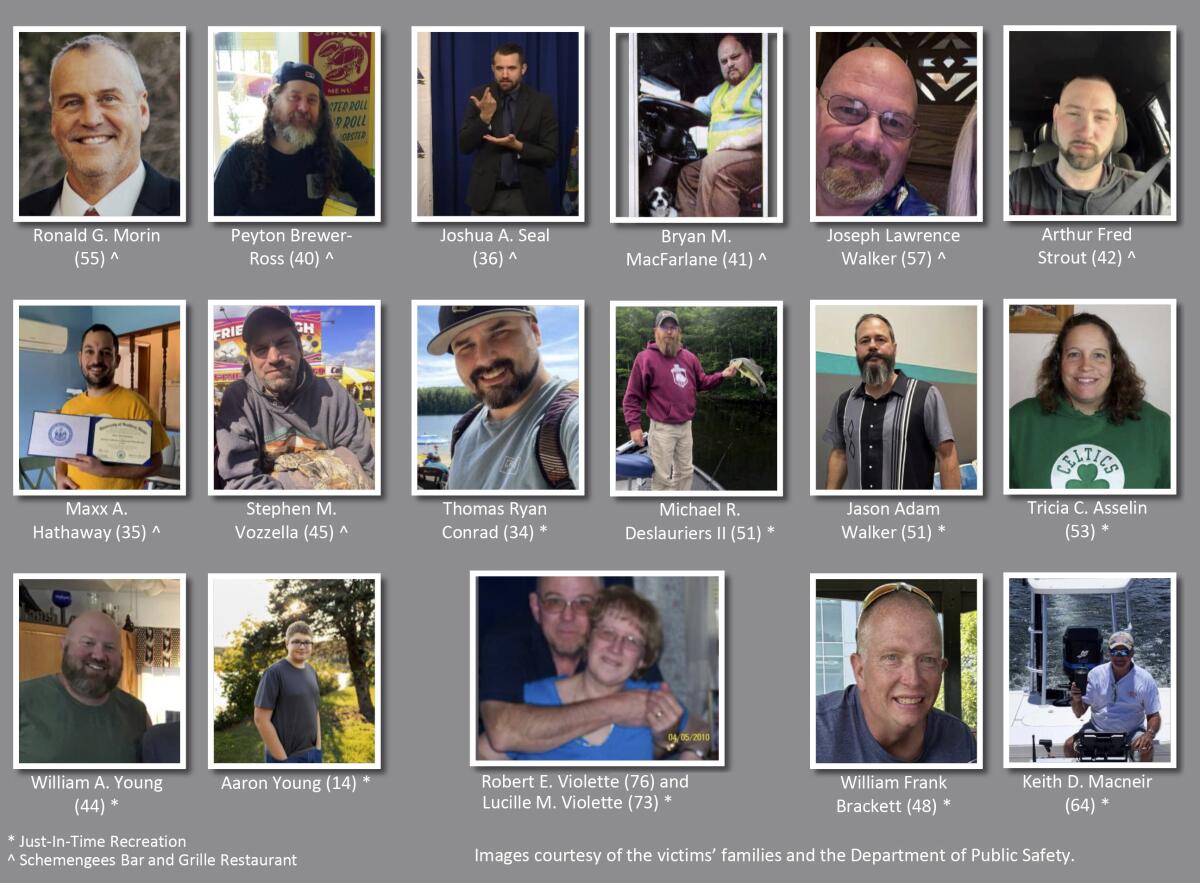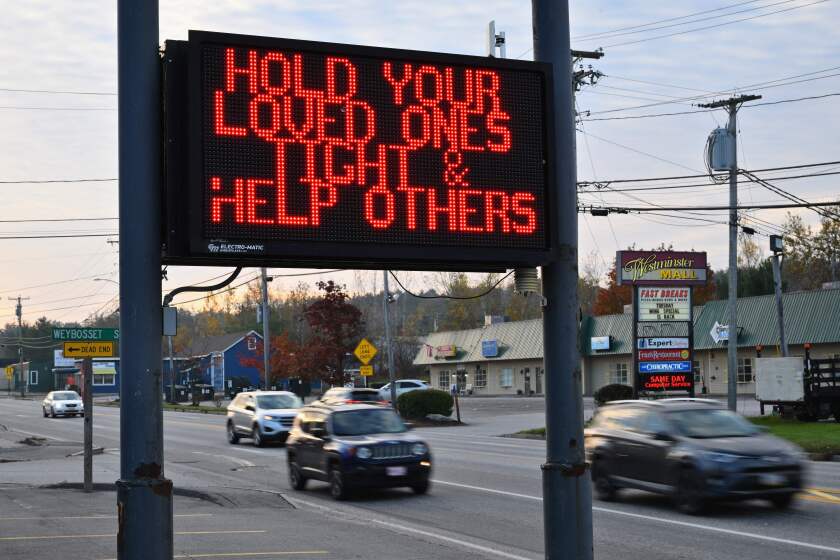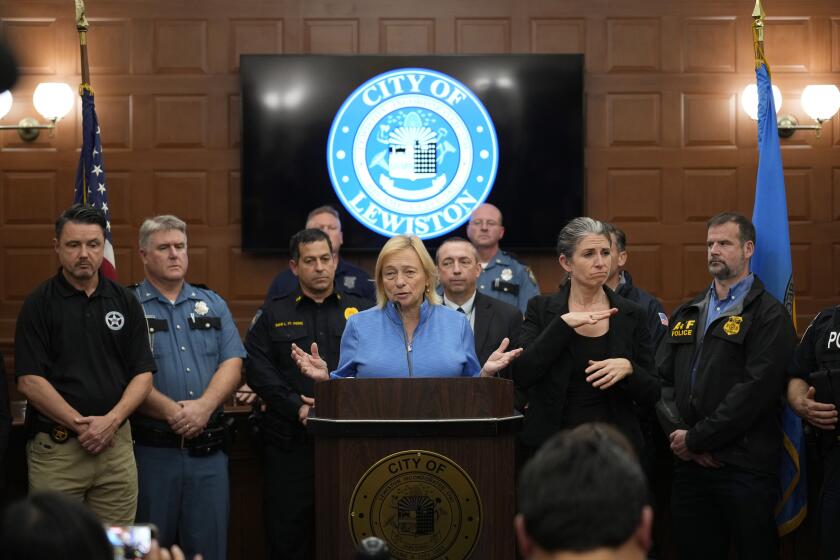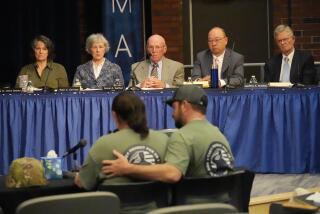Maine mass shooter heard voices, may have embraced conspiracy theories, officials say

LEWISTON, Maine — The gunman who killed 18 people in Maine reported mental health issues, including that he may have been hearing voices and believed people were talking about him, officials said Saturday.
Police have still not declared a motive in the case, but Maine Public Safety Commissioner Mike Sauschuck said the gunman, Robert Card, showed signs of mental illness.
“There’s a paranoia, there’s a conspiracy theorist piece,” Sauschuck said Saturday.
Law enforcement sources have told The Times that Card was committed to a mental health facility for two weeks over the summer and released. But authorities said Saturday they were not aware of any “forcible” mental health visits but are continuing to piece together Card’s history.
Nearly two days after he allegedly shot 18 people to death at a bowling alley and bar, the suspect in the deadliest assault in Maine’s history remained at large.
Authorities had spent days searching for Card, who opened fire at two Lewiston establishments late Wednesday, killing 18 and wounding at least 13 others. Police are still investigating why Card targeted those establishments.
“I think that there’s a connection to all of those locations,” Sauschuck said. “I think that both of those spots — I will tell you from a community standpoint, a lot of people in this community were familiar with both spots, right? So this thing happens and everybody’s like: ‘I was there once before. My family visits that spot.’ ... I do believe that there’s a connection, as if this gentleman had been in both of those spots.”
Sauschuck also did not say whether Card had any prior relationship with any of the victims, saying that would “speak to premeditation” and would be a motive “above and beyond the mental health crisis that we know exists.”
Card was found dead Friday of an apparent self-inflicted gunshot wound, ending an epic manhunt that forced a swath of Maine to shelter in place.
Sauschuck said Card was found around 7:45 p.m. Friday in an unlocked box-trailer in an overflow parking lot across the road from the Maine Recycling Corp. in nearby Lisbon, less than a mile from where Card’s vehicle was found. A weapon was found inside the vehicle.
Police had twice cleared the area where the recycling plant is located and the trailers sitting on that lot, Sauschuck said.
The owner of the recycling facility called Lewiston authorities and asked whether police also swept the overflow parking lot, where close to 60 trailers full of recycled metal and other materials sit, saying Card knew the area well.
“The owner was very diligent,” Sauschuck said. It was unclear whether Card was currently employed at the center.
Maine State Police found Card’s body in one of the first three trailers, he said. An initial investigation shows Card appears to have walked to the lot.
It was unclear Saturday morning how long Card had been deceased when he was found. Two firearms were discovered at the scene, Sauschuck said, and authorities said Card appeared to have on the same sweatshirt he was wearing during the attacks.
Twelve search warrants have been executed, including for a cellphone and for Card’s residence. Sauschuck said Card also left behind a note at his residence to a loved one containing details about his phone passcodes and bank information. “I wouldn’t describe it as an explicit suicide note, but the tone and tenor was that the individual was not going to be found.”
All three firearms appear to be purchased legally by Card, authorities said. Some of the guns were purchased just before the shootings.
Maine shooting suspect found dead of apparent self-inflicted gunshot wound, ending days-long manhunt
Law enforcement found Robert Card dead at 7:45 p.m. Friday in the area of Lisbon Falls, not far from where his vehicle was located.
The discovery of Card’s body on Friday night was met with relief in the local community. Some residents came out to confirm the news for themselves.
Sophia Bailey, who owns Jeff’s Jamaican Cuisine food truck, had just signed off from a virtual vigil when messages began flooding her phone, saying Card’s body had been found.
“I want to make sure it’s true,” Bailey said. She had been on edge for the last 48 hours, she said, racked by nerves, anxiety and sadness.
“Now I’m feeling that sense of peace, but we know the mourning continues,” she added. “We all have to go through this as a community.”
Casey Ring and her 15-year-old daughter, Olivia Brown, also traveled to the scene. They’d spent the previous two days sheltered at home in a wooded area in nearby Brunswick. Ring has other young children at home and said it’s been challenging to talk to them about a scary and uncertain time.
“Hearing it was a big sigh of relief, not only feeling relief for the victims and their families but for the extended Card family,” Ring said. “They’re grieving their loss of a family member too.”
Olivia said her school is on a modified schedule Monday, open for just a couple of hours. She hopes they discuss the shootings.
“It would be good to get everybody on the same page,” she said, adding that she hopes they can also begin to take steps toward healing.
Card lived in Bowdoin, local media reported, about 25 miles east of the scene of the two shootings in Lewiston, which is Maine’s second-most populous city. He divorced his wife in 2007, citing irreconcilable differences, according to the Times Record of Brunswick, Maine.
Card and the woman had a son, who is now 18. An amendment to the divorce judgment required both Card and his ex-wife to keep any weapons “under lock and key” when they weren’t being used, the Times Record reported.
Bryce Dubee, a spokesman for the U.S. Army, said Card enlisted in the Army Reserves in 2002.
He was never deployed to combat and served as a petroleum supply specialist, Dubee said. He held the rank of sergeant first class, assignment to the Reserves’ 3rd Battalion, 304th Infantry Regiment in Saco, Maine, Dubee said. Card received various military honors during his 21-year tenure, he added.
However, when Card was deployed over summer to the Army Reserve Unit at Camp Smith Training Center in Cortlandt, N.Y., his commanding officers were so concerned about his state of mind that police were called to take Card to the Keller Army Community Hospital in West Point for evaluation, according to a source who wasn’t authorized to speak with the media and requested anonymity.
It wasn’t clear whether Card was diagnosed with any mental conditions during the evaluation. Law enforcement officials have been told that Card was spending much of his time on antigovernment websites, the source added.
Card’s unit was assigned to support training at West Point in July, Dubee said, but “there are no records to indicate he instructed or participated in any training.”
Petri reported from Lewiston. Winton and Ormseth reported from Los Angeles.
More to Read
Sign up for Essential California
The most important California stories and recommendations in your inbox every morning.
You may occasionally receive promotional content from the Los Angeles Times.














